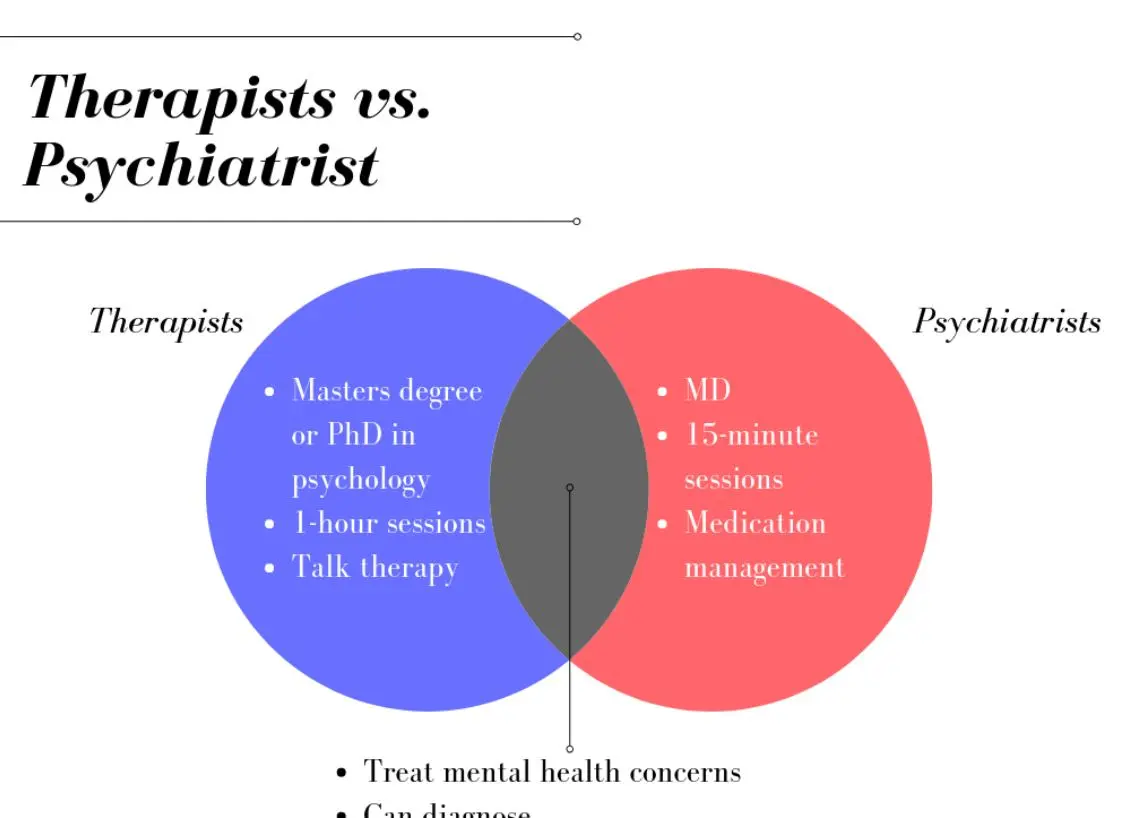Psychiatrist vs Therapist: Understanding Mental Health Professionals
When it comes to mental health care, two key professionals often come to mind: psychiatrists and therapists. While both play crucial roles in supporting mental well-being, they have distinct differences in their training, approach, and scope of practice. Understanding these differences can help you make informed decisions about your mental health care.
What is a Psychiatrist?
A psychiatrist is a medical doctor who specializes in mental health. After completing medical school, they undergo additional training in psychiatry, typically through a four-year residency program. This extensive medical background equips psychiatrists with a unique set of skills and knowledge.
Key aspects of a psychiatrist’s role include:
- Diagnosing mental health disorders
- Prescribing and managing medications
- Conducting medical tests to rule out physical causes of symptoms
- Providing psychotherapy in some cases
Psychiatrists are particularly suited to treat complex mental health conditions that may have biological components or require medication management. They often work with patients who have severe mental illnesses such as schizophrenia, bipolar disorder, or major depressive disorder.
What is a Therapist?
A therapist, on the other hand, is a broader term that encompasses various mental health professionals, including psychologists, licensed clinical social workers, and licensed professional counselors. While their specific educational backgrounds may vary, therapists typically hold at least a master’s degree in a mental health-related field.
The primary focus of a therapist is to provide psychotherapy or “talk therapy.” This involves:
- Helping clients understand their thoughts, feelings, and behaviors
- Teaching coping strategies and problem-solving skills
- Addressing relationship issues and life challenges
- Providing support for emotional difficulties
Therapists use various therapeutic approaches, such as cognitive-behavioral therapy (CBT), dialectical behavior therapy (DBT), or psychodynamic therapy, depending on their training and the client’s needs.
Key Differences Between Psychiatrists and Therapists
To better understand the distinctions between these two professions, let’s break down the key differences:
| Aspect | Psychiatrist | Therapist |
|---|---|---|
| Education | Medical degree (MD or DO) | Master’s or doctoral degree in psychology or related field |
| Ability to prescribe medication | Yes | No (with some exceptions) |
| Primary treatment approach | Medication management and medical interventions | Psychotherapy (talk therapy) |
| Focus of treatment | Biological aspects of mental health | Psychological and emotional aspects |
| Typical session length | 15-30 minutes | 45-60 minutes |
| Frequency of sessions | Less frequent (monthly or as needed) | More frequent (weekly or bi-weekly) |
When to See a Psychiatrist
You might consider seeing a psychiatrist if:
- You’re experiencing severe symptoms that significantly impact your daily life
- You have a complex mental health condition that may require medication
- Previous therapy or counseling hasn’t been effective
- You’re dealing with both mental and physical health issues
- You’re considering medication as part of your treatment plan
Psychiatrists are particularly helpful for conditions like bipolar disorder, schizophrenia, severe depression, or anxiety disorders that may require medication management.
When to See a Therapist
A therapist might be more appropriate if:
- You’re dealing with life transitions or relationship issues
- You want to develop coping strategies for stress or emotional challenges
- You’re seeking to understand and change behavioral patterns
- You prefer talk therapy as your primary form of treatment
- You’re dealing with mild to moderate mental health concerns
Therapists can be particularly helpful for issues like mild to moderate depression, anxiety, grief, trauma, or personal growth and development.
Collaboration Between Psychiatrists and Therapists
In many cases, psychiatrists and therapists work together to provide comprehensive care. This collaborative approach can be especially beneficial for individuals with complex mental health needs. For example:
- A psychiatrist might manage medication while a therapist provides ongoing counseling
- A therapist might refer a client to a psychiatrist for medication evaluation
- A psychiatrist might recommend therapy in addition to medication for optimal treatment
This teamwork ensures that patients receive well-rounded care that addresses both the biological and psychological aspects of mental health.
Choosing Between a Psychiatrist and a Therapist
Deciding whether to see a psychiatrist or a therapist depends on your specific needs and circumstances. Consider the following factors:
- The nature and severity of your symptoms
- Your preference for medication vs. talk therapy
- Your insurance coverage and financial considerations
- Recommendations from your primary care physician
- Your comfort level with different types of treatment
Remember, it’s okay to start with one type of professional and later transition or add another if needed. The most important thing is to take that first step towards getting help.
Frequently Asked Questions (F.A.Q)
Q1. Can a therapist diagnose mental health conditions?
Yes, many therapists, particularly those with advanced degrees like psychologists, can diagnose mental health conditions. However, their approach to diagnosis may differ from that of a psychiatrist, focusing more on behavioral and emotional symptoms rather than medical aspects.
Q2. Do I need a referral to see a psychiatrist or therapist?
It depends on your insurance and the specific provider. Some psychiatrists require a referral from a primary care physician, while many therapists can be seen without a referral. Check with your insurance provider and the mental health professional you’re considering to understand their specific requirements.
Q3. How long does treatment typically last?
The duration of treatment varies widely depending on the individual, the condition being treated, and the type of therapy. Some people might see improvement in a few months, while others may benefit from longer-term treatment. Your mental health professional can provide a more specific timeline based on your unique situation.
Q4. Can I see both a psychiatrist and a therapist?
Absolutely. Many people benefit from seeing both a psychiatrist for medication management and a therapist for ongoing counseling. This combined approach can be particularly effective for complex mental health conditions.
Q5. Are online sessions with psychiatrists or therapists effective?
Yes, telepsychiatry and online therapy are effective for many mental health conditions. They offer convenience and accessibility, especially for those who may have difficulty attending in-person sessions. However, the suitability of online sessions can depend on your specific needs and preferences.
Wrapping Up
Understanding the difference between psychiatrists and therapists is crucial for making informed decisions about your mental health care. While both play vital roles in supporting mental well-being, their approaches and areas of expertise differ. By considering your specific needs and working with healthcare professionals, you can determine the best path forward for your mental health journey.




